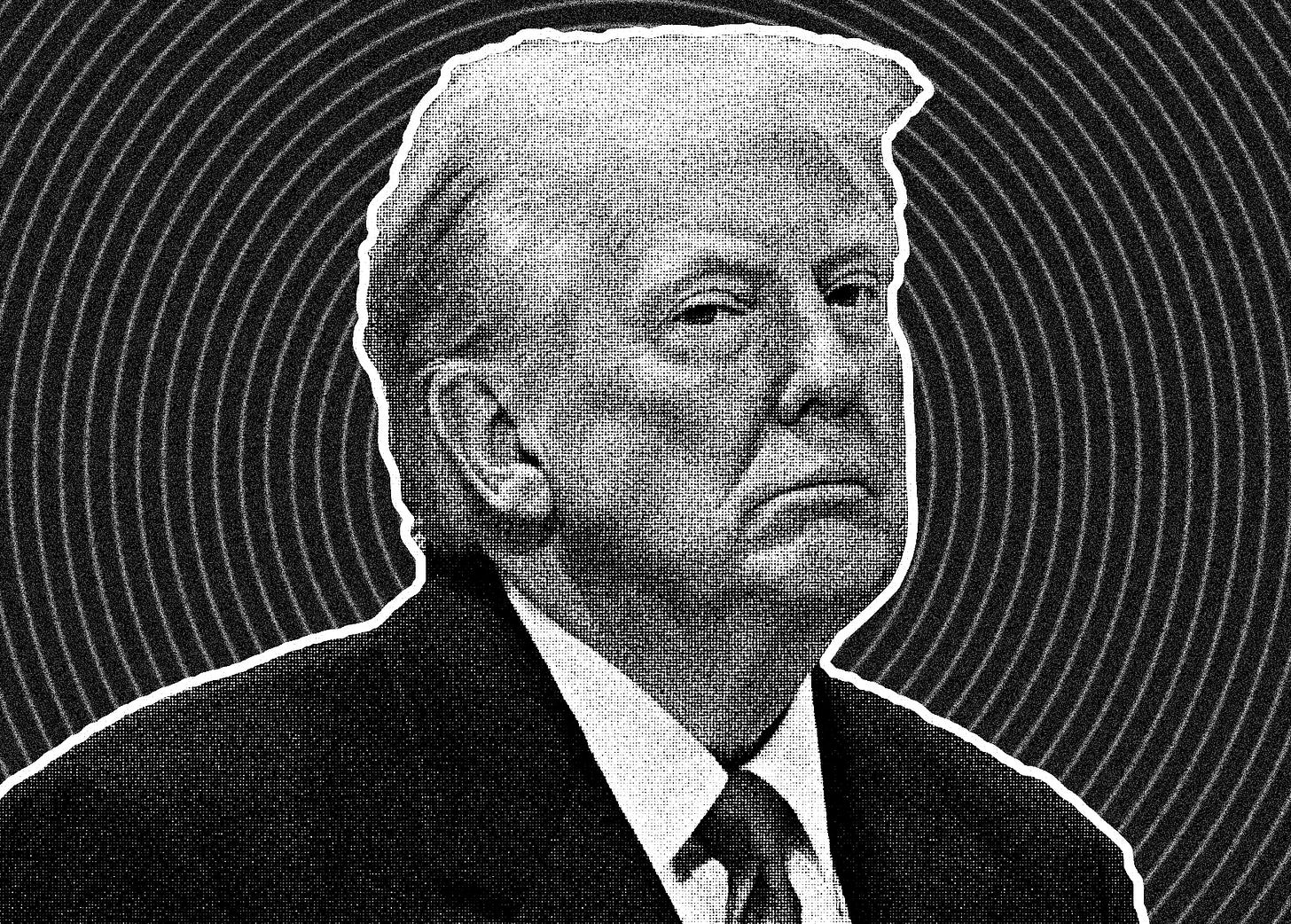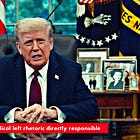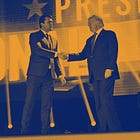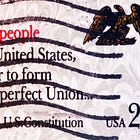Trump’s Censorship Binge After Kirk’s Killing Is Part of an All-Out Effort to Crush the Opposition
He is rapidly consolidating his power so that no one can even challenge his authoritarian takeover
“When you have a [television] network and you have evening shows, and all they do is hit Trump,” complained the most powerful man in the world while onboard Air Force One, returning from a white-tie dinner with King Charles III last week. “They’re licensed. They’re not allowed to do that.”
As ever, the statement was unvarnished in its egotism, dropping the pretense that Trump’s latest attack on free speech had anything to do with the distasteful reaction in some quarters to the shocking murder of Charlie Kirk. Instead, fresh from Windsor Castle, Trump put on full view his impulse for a gilded lèse-majesté—avenging the alleged defamation of himself as head of state.
Facing threats of revoked broadcast licenses, ABC and its parent company Disney suspended Jimmy Kimmel, host of the eponymous late-night show. They caved even though the threats were blatantly illegal and unconstitutional and any effort to actually implement them would be thrown out in court.
In theory, Kimmel was canceled because of a single ill-advised line that MAGA was intent on denying that Kirk’s shooter was “one of them” in a longer monologue making fun of Trump’s rather indifferent reactions to his friend’s killing. In reality, Trump has long fumed about using the FCC, now under the helm of censor-in-chief Brendan Carr, to target news and comedy shows not to his liking.
Carr seems more than happy to oblige his boss. He doubled down on Trump’s threats by publicly suggesting that broadcasters that continued to air such content would face consequences. Nexstar and Sinclair, two of the biggest local TV station owners that own many of the local affiliates of ABC, promptly complied. Nexstar and Disney, which owns ABC, both have major acquisitions under FCC review. The message to them was clear: air something the administration dislikes, and maybe your broadcast license, your regulatory permissions, your corporate strategic plans are in jeopardy.
Kimmel’s cancellation in isolation would be bad enough. But it is part of a far broader effort to suppress disfavored speech and control political discourse. Indeed, the attack on free speech and free elections are two sides of the same coin, and we can’t treat them as separable. We cannot get lost in each new offense, missing the forest for the trees. We must understand that what is happening is a campaign to disarm and discredit the opposition and make it harder for it to mount an effective challenge to Trump’s growing authoritarianism.
The Censorship Crusade
Vice President JD Vance, Speaker Mike Johnson, and White House consigliere Stephen Miller have all articulated a clearer version of this agenda: criticizing Trump and his party as authoritarian or a threat to democracy is tantamount to incitement of violence and will no longer be tolerated. “With God as my witness, we are going to use every resource we have at the Department of Justice, Homeland Security, and throughout this government to identify, disrupt, dismantle, and destroy these networks and make America safe for the American people,” Miller said. “It will happen, and we will do it in Charlie’s name.”
Despite Miller’s purple prose, Trump’s all-out assault on free speech didn’t begin with the death of Charlie Kirk, and it will not end with it. Nor are corporate TV networks the only ones being targeted. Vexatious litigation and extorted settlements, purges of the military and civil service, and the rewarding of allies and punishing of enemies are all being deployed simultaneously.
One of Trump’s favorite tactics is to sue major media outlets for defamation in his personal capacity. But when personal suits are filed by the man who controls the entire coercive apparatus of the state, he does not have to wait for the courts to decide in his favor. Thus Trump got Paramount, owner of CBS, to hand over $16 million in a bribe—er, “settlement”—on charges of alleged bias in its editing of a 60 Minutes Kamala Harris interview, which would not have been actionable even if it had been true, and it wasn’t. Shortly thereafter, the network canceled Stephen Colbert, another late-night comedian who habitually mocks Trump. ABC, too, prior to the Kimmel episode, settled a similar lawsuit against George Stephanopoulos for misstating that Trump had faced civil liability for rape—instead of “sexual abuse” under New York’s antiquated legal definition—of E. Jean Carroll, paying millions of dollars in compensation to Trump’s presidential library foundation. And now The New York Times has become a target of Trump in a floridly insane complaint that, in the course of describing Trump’s greatness in a manner reminiscent of North Korean propaganda, demands billions of dollars in damages for defamation for allegedly being a mouthpiece of the Democratic Party. A judge has thrown out the lawsuit on his own initiative without even waiting for the Times to reply, in a scathing ruling denouncing Trump’s lawyers as unserious and unprofessional. Still, he can try again and may yet file a revised complaint.
With the exception of the Carroll lawsuit, the others were all aimed squarely at suppressing political speech that was either critical of Trump or, in his view, insufficiently negative toward his opponents. This is clearly a page pulled from the “competitive authoritarianism” playbook to make the sitting wannabe dictator more electorally competitive. But Trump doesn’t just beat his media opponents with sticks. He also dangles carrots before cronies willing to shape the political narrative to his liking.
So the administration has given the popular Chinese-owned social media platform TikTok repeated, and unlawful, reprieves from a law passed by Congress and upheld by the Supreme Court requiring the platform to be shut down until it is divested of its Chinese ownership due to national security concerns. (For what it’s worth, the law is both bad policy and, in my view, the Supreme Court was wrong to uphold it, but that doesn’t mean the president can unilaterally decide otherwise.) Now, a deal is reportedly underway to hand TikTok’s U.S. operations over to tech tycoons Larry Ellison and Marc Andreessen. The political implications of handing over control of a platform strongly favored by impressionable youth to Trump-aligned billionaires are hardly subtle, especially when another billionaire has on his own bought the other big platform, X, and turned it into a tool for MAGA propaganda.
Meanwhile, at the Pentagon, Secretary Hegseth has taken the unprecedented action of firing service members for anti-Kirk speech. The agency claims that it went after only those “celebrating” Kirk’s death. But that is false. The Pentagon even suspended an Army colonel who called the assassination “tragic” but said Kirk had spread “hate, racism, homophobia, misogyny, and transphobia.” You might disagree with that characterization, but Kirk was a political figure engaged in political controversies, and nobody is obligated to praise his views. The point, it seems, is to incrementally create a MAGA-friendly military force more likely to obey the president. It is not unrelated that among the first steps Hegseth undertook was to fire much of the sitting military brass, including many in the Judge Advocates General’s Corps, the military’s lawyers charged with advising the agency about staying within the law, and to instead install loyalists.
Vice President Vance has also publicly named progressive nonprofits whose tax-exempt status the administration plans to revoke for funding groups allegedly inciting violence against the right. That would be flagrantly illegal, but the process is the punishment. The mere prospect of having to defend against such an attack is its own immense burden.
In as many words, we no longer have a government that respects and is bound by the First Amendment. From legacy mainstream media corporations to individual citizens, from higher education to politicians, from officeholders to military rank and file, from government agencies to private nonprofits, every institution is being silenced, co-opted, or remade to serve authoritarian ends.
In a large and raucous country with so many voices, no crackdown can be complete. However, authoritarians don’t have to suppress all dissent to thwart an effective resistance. They simply chill, discourage, push critics out of the most visible heights of public discourse. They force them to defend themselves rather than go on the offensive against their draconian tactics.
We can’t pretend this is normal, or that the political opposition can carry on without adapting to this reality.
War on Free Speech = War on Democracy
Political scientist Adam Przeworski has quipped that “democracy is a system in which parties lose elections.” In other words, the framework requires a certain baseline acceptance that opponents are legitimate, and they can legitimately win. This recognition must be mutual and reciprocal—the dividing line that separates democratic parties from anti-democratic ones. It is not a promising sign that the party now in power completely rejects this, and systematically and repeatedly acts upon that belief.
Trump and his flunkies have viciously and consistently threatened the idea of legitimate opposition, up to and including personally mocking, inciting, and condoning violence to the point of causing an insurrection. Yet they accuse the opposition, much less credibly, of the same. Every accusation is a confession, as it were.
The federal government is waging a censorship campaign, an all-out war on the First Amendment, on a scale without precedent in living memory. America is due for midterm congressional elections next year, and the next presidential election two years after that. In the current environment, we must face the grim reality that neither will take place on a level playing field, free from threats and retribution from the incumbent and his regime. It’s no longer a question of whether it can happen here. It is happening here.
So what can be done about it?
The Congealing Backlash
Authoritarians thrive on fragmentation. Competitive authoritarian regimes of the type which have proliferated in the 21st century rarely require outright one-party rule; they rely on a tilted field and an opposition too divided to surmount it. The United States now faces that test. The point of each lawsuit, every regulatory threat, every reprieve for cronies and punishment of dissent, is to demoralize and divide those who still believe in constitutional government.
But there is good reason for optimism: Trump and his goons are overreaching, and their own incompetence will result in uniting the opposition and fracturing his coalition rather than vice versa. Ted Cruz, hardly a paragon of principled resistance, forthrightly condemned Carr’s threats against Kimmel. Attorney General Pam Bondi’s threat to go after criticism of Kirk’s politics as “hate speech” also attracted backlash on the right, including from Tucker Carlson.
Democrats, too, have responded with more alacrity than usual. The very next day after Kimmel’s suspension, senators led by Connecticut’s Chris Murphy announced a rough outline, with fully drafted legislative language to follow, for a bill attached with the acronym: the NOPE (No Political Enemies) Act.
While the details remain to be seen, Murphy’s description suggests tools analogous to a federal anti-SLAPP law that would allow First Amendment litigation against the federal government. This would include procedures such as easier motions to dismiss, provisions to force the government to cover legal fees for successful litigants, and the strengthening of the legal standards for lawsuits. It is possible that this bill, or some version of it, could become a Democratic demand in the looming shutdown negotiations, as it should.
Across civil society, from labor unions to other entertainers, the backlash has also been substantial. It seems likely that in taking such a high-profile target like Kimmel, and in such a ham-fisted and blatantly unconstitutional manner, the administration bit off more than it could chew. Even as traditional television has been in decline, the late-night shows attract a substantial audience. Americans who aren’t regular viewers know who the hosts are and regularly see clips in their social media feeds.
The lesson from other nations that have slipped into this gray zone is clear: only the broadest possible coalition of liberal-democratic forces can halt the slide toward authoritarianism. Moderate liberals and farther-left progressives, middle-of-the-road centrists and principled conservatives—anyone committed to the rule of law, free and fair elections, and the peaceful rotation of power—must recognize that they have more in common with each other than with a regime intent on entrenching its permanent dominance.
Defeating the threat requires electoral wins despite manipulation and intimidation, coordinated organizing even under threat of reprisal, and a relentless public insistence on basic freedoms. The uneven playing field is real, but the history of competitive authoritarianism in democracies, the experience of other countries, the rapidly growing unpopularity of this administration, all show that united democratic opposition can still prevail.
One last thing…
Here’s a hilarious version of the same point as this piece by the incomparable, invaluable, and indispensable Jon Stewart. He brings the receipts of this administration’s hypocrisy, duplicity, and sheer absurdity here. Do watch:
© The UnPopulist, 2025
Follow us on Bluesky, Threads, YouTube, TikTok, Facebook, Instagram, and X.
We welcome your reactions and replies. Please adhere to our comments policy.









I actually think they are using Charlie Kirk’s shooting as a way to justify ramping up their authoritarian agenda. Quell free speech by calling it hate speech and accuse the Democrats of violence against them. It would probably sound evil, but it seems very convenient that this deed was done at a time when their popularity was at an all time low!
Powerful and brilliant. THANKS for this.